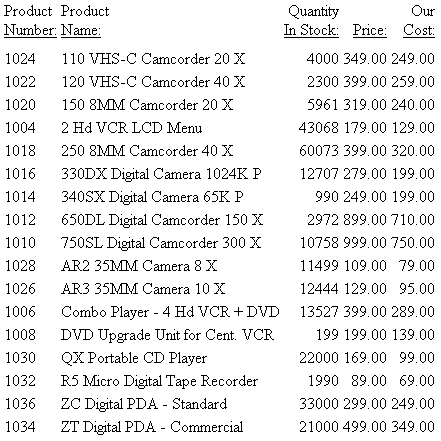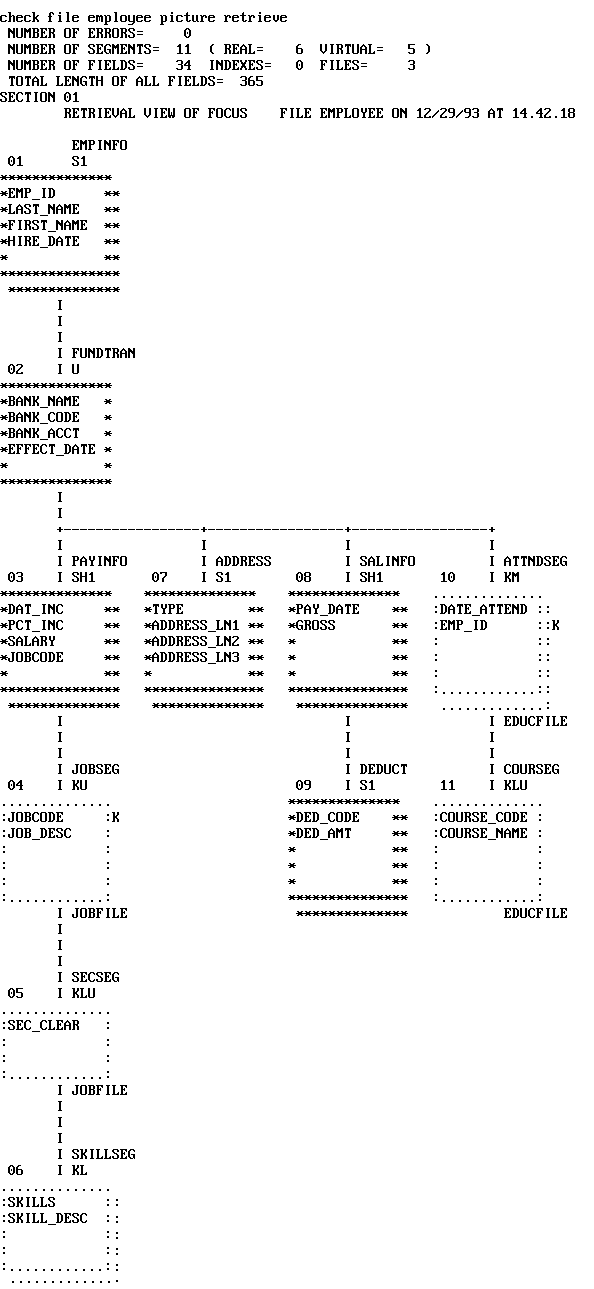The display commands LIST and PRINT list the individual
values of the fields you specify in your report request. LIST numbers
the items in the report. PRINT does not number the items.
You can easily display all of the fields in the data source by
specifying an asterisk (*) wildcard instead of a specific field
name, as described in Displaying
All Fields.
For all PRINT and LIST requests, the number of records retrieved
and the number of lines displayed are the same. In addition, there
is no order to the report rows. The PRINT and LIST commands display
all the values of the selected fields found in the data source in the
order in which they are accessed. The order in which data is displayed
may be affected by the AUTOPATH setting. For more information, see Optimizing Retrieval Speed for FOCUS
Data Sources, and the documentation on SET parameters in
the TIBCO WebFOCUS® Developing Reporting Applications manual.
In general, when using PRINT or LIST, the order of the values
displayed in the report depends on whether or not the field is a
key field, as described in the Describing Data With TIBCO WebFOCUS® Language manual.
Alternatively, you can sort the values using the BY or ACROSS
sort phrases. When LIST is used in a request that includes a sort
phrase, the list counter is reset to 1 every time the value in the
outermost sort field changes. For more information on sorting, see Sorting
Tabular Reports.
PRINT * or PRINT SEG.* prints only the
real fields in the Master File. To print virtual fields, explicitly
reference them in the PRINT statement (PRINT * virtual field name).
This is true even if the virtual field name is a re-defines of a
real field.
For PRINT and LIST syntax, see Use
Display Commands in a Request.
Example: Displaying Individual Field Values
To display the values of individual
fields, use the PRINT command. The following request displays the
values of two fields, LAST_NAME and FIRST_NAME, for all employees.
TABLE FILE EMPLOYEE
PRINT LAST_NAME AND FIRST_NAME
END
The following shows the
report output.
LAST_NAME
--------- |
FIRST_NAME
---------- |
STEVENS
SMITH
JONES
SMITH
BANNING
IRVING
ROMANS
MCCOY
BLACKWOOD
MCKNIGHT
GREENSPAN
CROSS |
ALFRED
MARY
DIANE
RICHARD
JOHN
JOAN
ANTHONY
JOHN
ROSEMARIE
ROGER
MARY
BARBARA |
Example: Listing Records
To number the records in a report, use
the LIST command.
TABLE FILE EMPLOYEE
LIST LAST_NAME AND FIRST_NAME
END
The following shows the
report output.
LIST
----
1
2
3
4
5
6
7
8
9
10
11
12 |
LAST_NAME
---------
STEVENS
SMITH
JONES
SMITH
BANNING
IRVING
ROMANS
MCCOY
BLACKWOOD
MCKNIGHT
GREENSPAN
CROSS |
FIRST_NAME
----------
ALFRED
MARY
DIANE
RICHARD
JOHN
JOAN
ANTHONY
JOHN
ROSEMARIE
ROGER
MARY
BARBARA |

